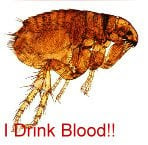Kennen Sie Ihren Feind (das Floh)
.jpg)
There is an unbreakable rule of war: Know Your Enemy. Know them inside and out, what their weaknesses are, their schedules, where they sleep, what they eat, and their greatest fears. To establish true mastery over a foe, one must become intimately aware of all that they are. Make no mistake, if you wish to win the war against parasites your greatest weapon will always be knowledge. Knowing how a flea operates is the quickest and surest way to lead your enemy to an untimely and immediate end.
 Some Strange Facts about Nature’s Tiniest Vampires
Some Strange Facts about Nature’s Tiniest VampiresThe basic facts about fleas are obvious: excellent jumpers, they suck blood, flea bites are itchy, etc. However, there is much more to these insectoid Draculas than a shallow evaluation would suggest. There are over 2000 different varieties of fleas. These varieties are classified mostly for the type of hosts they inhabit. Strangely enough, fleas are like connoisseurs. They only go for one kind of prey, a sort of interspecies brand loyalty that even Apple executives would have to envy.
 Flea Bites
Flea BitesFlea bites can significantly lower a pet’s quality of life. A flea bite has its obvious effect: a swollen itchy bump that can leave a pet tearing out chunks of hair in frustration. However, the damage it can do isn’t limited to an itchy inconvenience. Flea bites have been known to cause allergic reactions due to flea saliva, significant hair loss sometimes leading to Hotspots, and in rare cases even Anemia.
There are two main types of treatment for eradicating fleas: Tablets and Topicals. Topicals are the preferred method of flea control for most pet owners due to the ease of application and overall efficacy. One drop of a topical will translocate across a dog or cat’s skin via the sebaceous system, (these are the glands that secrete oil in mammals,) and circulate through the animal’s blood stream as well, often killing intestinal or arterial parasites as part of the bargain. Tablets work by interrupting the flea life cycle. The prevent flea eggs from hatching into larvae.






 Alle Artikel
Alle Artikel Tipps und Tricks
Tipps und Tricks Gesundheit und Wohlbefinden
Gesundheit und Wohlbefinden Produktrezensionen
Produktrezensionen Lustig und skurril
Lustig und skurril





